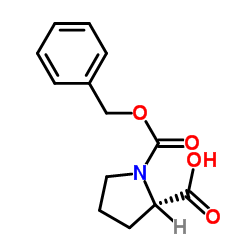Proline prodrug of melphalan targeted to prolidase, a prodrug activating enzyme overexpressed in melanoma.
Sachin Mittal, Xueqin Song, Balvinder S Vig, Gordon L Amidon
Index: Pharm. Res. 24(7) , 1290-8, (2007)
Full Text: HTML
Abstract
To determine the bioactivation and uptake of prolidase-targeted proline prodrugs of melphalan in six cancer cell lines with variable prolidase expression and to evaluate prolidase-dependence of prodrug cytotoxicity in the cell lines compared to that of the parent drug, melphalan.Hydrolysis, cell uptake, and cell proliferation studies of melphalan and the L: - and D: -proline prodrugs of melphalan, prophalan-L: and prophalan-D: , respectively, were conducted in the cancer cell lines using established procedures.The bioactivation of prophalan-L: in the cancer cell lines exhibited high correlation with their prolidase expression levels (r (2) = 0.86). There were no significant differences in uptake of melphalan and its prodrugs. The cytotoxicity of prophalan-L: (GI(50)) in cancer cells also showed high correlation with prolidase expression (r (2) = 0.88), while prophalan-D: was ineffective at comparable concentrations. A prolidase targeting index (ratio of melphalan to prophalan-L: cytotoxicity normalized to their uptake) was computed and showed high correlation with prolidase expression (r (2) = 0.82).The data corroborates the specificity of prophalan-L: activation by prolidase as well as prolidase-targeted cytotoxicity of prophalan-L: in cancer cell lines. Hence, prophalan-L: , a stable prodrug of melphalan, exhibits potential for efficiently targeting melanoma with reduced systemic toxicity.
Related Compounds
| Structure | Name/CAS No. | Molecular Formula | Articles |
|---|---|---|---|
 |
Z-Pro-OH
CAS:1148-11-4 |
C13H15NO4 |
|
Prolidase is required for early trafficking events during in...
2014-10-01 [J. Virol. 88(19) , 11271-83, (2014)] |
|
N-benzyloxycarbonyl-L-proline: an in vitro and in vivo inhib...
2005-06-30 [Biochim. Biophys. Acta 1744(2) , 157-63, (2005)] |
|
Prolidase-dependent regulation of TGF c and TGF β receptor e...
2010-01-01 [Eur. J. Pharmacol. 649(1-3) , 115-9, (2010)] |
|
Cytotoxicity of carbobenzoxy-protected amino acids.
1992-05-01 [In Vitro Cell. Dev. Biol. 28A(5) , 300-2, (1992)] |